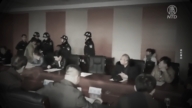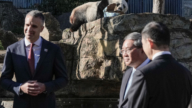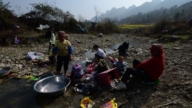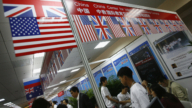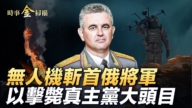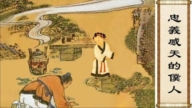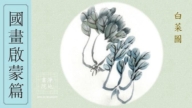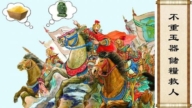【新唐人2012年12月24日訊】多年來,中國大陸的農民一直生活艱辛、社會地位低下,再加上當局通過強拆強佔等方式剝奪了土地等資源,越來越多的農民被迫起來維護自己的權益,全民抗暴越演越烈。在這樣的大背景下,中共最近宣稱,要著力促進農民增收,農民收入至少要與城鎮居民收入同步增長。當局這個舉措被民眾質疑是在忽悠民眾、玩文字遊戲。下面請看本臺記者的報導。
21號、22號,中共在北京召開了《中央農村工作會議》。會議談到,當前中國經濟最薄弱的環節是農業現代化滯後,城鄉體制、城鄉發展和居民收入差距過大。當局今後要加大農業投入力度,理順農產品價格,不斷增加農業補貼。會議指稱,要著力促進農民增收,今後一段時間,農民收入至少應與城鎮居民收入同步增長,並力爭超過。
「民生觀察」網站負責人劉飛躍:「這話聽起來當然很動聽。但可惜的就是我們不是第一次聽到這樣的動聽的話語。以前當局也曾經有很多(類似)說法或者是政策。」
「民生觀察工作室」網站負責人劉飛躍向《新唐人》表示,當局這種說法是為了試圖安撫人心、安撫農民。劉飛躍透露說,他自己是教師出身,前些年當局也曾在正式文件中承諾,教師工資不能低於公務員。
劉飛躍:「但這麼多年,我們看這個現實。教師和公務員的工資,不僅沒有趕上公務員的工資,而是差距在擴大。所以,它對農民這樣一個承諾一個說法,我們還是要打一個大大的問號。」
當局這一說法也引來網民的關注和質疑。網友發帖說:當局「又在玩文字遊戲」。網友指出:城鎮職工退休金每月二千,增加百分之十就加二百,農民每月五十,增加百分之十五則加七塊五毛?這就算農民超過了城市嗎?
網友質疑當局:談增幅?這是不是欺負農民不懂數學啊?
「中國公民監政會」發起人郭永豐也表示,當局這一說法沒有實質意義。
中國公民監政會發起人郭永豐:「這個制度下,極少數人發財賺錢。它不保障極少數權貴的利益?它不可能讓絕大多數人民都富裕的,那是不可能的。所有的資源和財富都是壟斷的,那就是說空話、忽悠人、欺騙人的。」
郭永豐認為,當局是在給農民「畫餅充飢」。他說,實際上,當今的中國農民根本沒有接受更好教育的機會,想要改變身處社會最底層的命運,基本不可能。
郭永豐:「受教育沒有機會,你就沒有基本的才能、知識和技術,你就不能找到一個好的工作。那就沒有好的機會,沒有好的工作機會,那你這一輩子就是在基層幹那個最艱苦、最髒、最累的活,但是收入極其微薄。」
大陸媒體報導,參加這次農村工作會議的有:中共中央農村工作領導小組成員,各省、自治區、直轄市及「計劃單列市」黨委和政府負責人等。政治局委員馬凱主持了第一次全體會議。
採訪/劉惠 編輯/李謙 後製/周天
CCP Regime Claiming to Boost Farmers’ Income
For decades, Chinese farmers have been
living in hardship at a low social status.
Moreover, they are deprived of land and other resources
by rampant officials grabbing land, and forced demolitions.
This has forced many more farmers to stand up to protect
their own interests and rights, joining surging mass protests.
Recently, the Chinese Communist Party (CCP) authorities
alleged to act to increase farmers’ income in the near future.
The claim has aroused questions from the public, as they
think it is word games that the CCP plays to fool civilians.
On December 21 and 22, a CCP Central Rural
Work Conference was held in Beijing, which
spoke about the weakest part of China’s economy.
These are a lagging agricultural modernization, large gap
between urban-rural development and residential income.
The meeting said that in the near future, the CCP
authorities will increase investment into agriculture,
rationalize agricultural products prices, and
continuously increase agricultural subsidies.
The meeting claimed to put an emphasis on boosting
farmers’income, so as to keep pace with, and even exceed urban residents’ income.
Liu Feiyue, Director of Civil Rights &Livelihood Watch:
“It sounds very appealing, but it’s not the first time
that we’ve heard such nice words.
Previously, there have appeared
many similar official talks or policies.”
Liu Feiyue, Director of msguancha.com, says that
this is an official attempt to appease public sentiment.
Liu reveals that he was previously a teacher.
A few years ago in an official document, the
CCP authorities promised that teachers’
salaries shall not be less than civil servants’.
Liu Feiyue: “But over the past few years, the
reality has shown that the salary gap between
teachers and civil servants are widening.
So such a promise to farmers is questionable.”
China’s netizens also questioned the regime’s talk.
A netizen posted that the authorities
are “playing with words again.”
Another calculated that an urban resident’s pension is
2,000 yuan a month, and a 10% increase is 200 yuan.
A farmer’s pension is 50 yuan, so
that’s 7.50 yuan for a 15% increase.
He asked, if this mean farmers’ income
overtakes that of urban residents?
A netizen questioned if they are talking about growth, or are
they bullying, as farmers don’t know how to calculate figures?
Guo Yongfeng, founder of Chinese Citizen Watchdog,
says the CCP authorities’ claim is essentially meaningless.
Guo Yongfeng: “Under the existing political
system, only very few people can make money.
Isn’t it protecting the interests of
a handful of rich and powerful people?
It won’t let the vast majority of the
people get rich, it’s impossible.
All resources and wealth are monopolized by them.
That’s merely empty talk, used to fool the general public.”
Guo Yongfeng views the CCP’s
claim as “feeding on illusions”.
He explains that nowadays Chinese
farmers have no access to education.
So it’s highly unlikely for them to change
their fate as being the grassroots group.
Guo Yongfeng: “They have no access to education, so they
have nowhere to learn basic skills, knowledge or technology.
Then they cannot find a good job, and thus have to stay and
work at the bottom of society, but with very meager income.”
China’s media reported that attendees of this
Central Rural Work Conference included members
of the CCP Central Rural Work Leading Group.
It also included Party chiefs and governors from
provinces, autonomous regions, municipalities
and cities specifically designated in the state plan.
Ma Kai, the 18th CCP Politburo member,
chaired the first plenary session.






